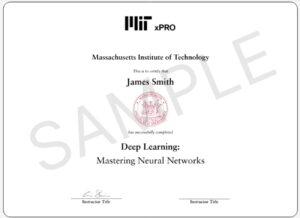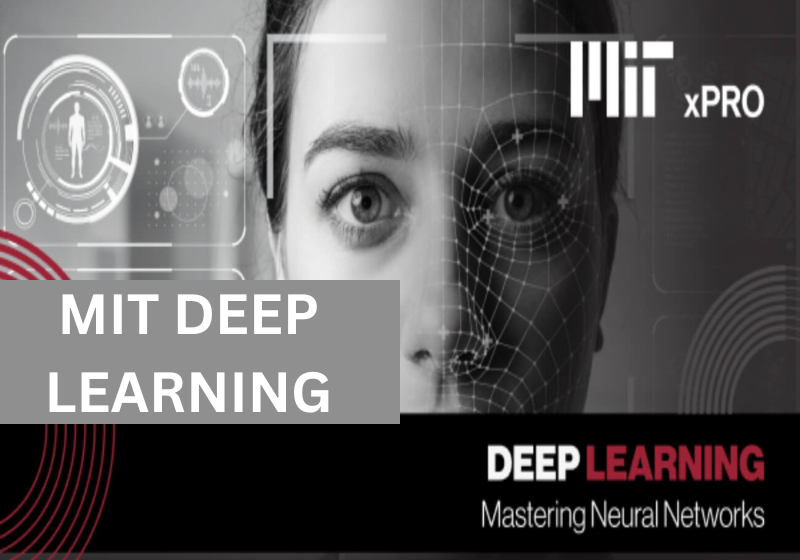Introduction
This blog post is a review of the MIT Professional Certificate in Deep Learning – Mastering Neural Networks. It will explore the basic information you need about the Certificate and whether or not it is worth it in the concluding part.
Some of the basic information are ;
- What is the Certificate about?
- The Breakdown of the Course Curriculum- module by module.
- Who is it for?
- Basic Requirement
- How long it takes to complete it
- The Certification cost and payment schedule
- The certificate you will get
- Is the Certificate worth it?
- Some frequently asked questions
What is the Certificate About?
The MIT Deep Learning Professional Certificate is an online certification program designed to train professionals to gain insights into Deep Learning and Neural Networks And apply that knowledge and skills in their various fields.
The Certificate program is taught by MIT faculty members and upon completion, leads to the award of an MIT Professional certificate. The certificate program consists of videos, study materials, group discussions, online sessions with facilitators, assessments, and a final Capstone project.
The Certificate Program Curriculum
The MIT Deep Learning curriculum is designed for you to experiment with deep learning models and algorithms using available machine learning tool kits. It consists of 8 training modules and is as follows;
Module 1: Foundations of Deep Learning

You will learn about the history of deep learning, its basic building blocks, and how to use gradient descent to discover how model coefficients and weights are learned.
The topics are;
- History of Machine Learning
- Overview of Key Machine Learning Concepts
- Linear and Logistic Regression Algorithms
- Perceptrons and Neural Networks
- Gradient Descent-Based Learning
Module 2: Basics of Python for Deep Learning
You will learn about Python as a programming tool and better understand the Python language through examples and
exercises. Also, you will learn about the fundamentals of machine learning models through the basics of Python.
The topics are;
- Introduction to Coding Tools
- Basics of Python
- Overview of Data Science-Related Python Libraries
- Introduction to Machine Learning using Python
- Python Classes
Module 3: Building and Training Neural Networks
You will learn to use data-science Python libraries to implement larger neural networks and learn how to define and train a multilayer perceptron (MLP) neural network. Finally, you will identify the train/validate/split paradigm and model evaluation metrics.
The topics are;
- Train/Test/Validate Split
- Overfitting vs Generalization
- Training Curves
- Dropout and Data Encoding
Module 4: Deep Networks
You will gain a better understanding of complex neural networks and how to train them. Also, learn about autoencoding as an architectural method and analyze basic concepts and challenges of deep neural networks.
The topics are;
- Neural Networks: Multilayer Perceptrons (MLPs)
- Autoencoders
- Convolutional Neural Networks (CNNs)
- Deep Neural Networks
Module 5: Deep Neural Networks Architectures

You will learn how to adapt existing deep convolutional neural networks to new applications using transfer learning, understand sequence-to-sequence mapping as an important machine learning task, and gain intuition behind recurrent neural network structures.
The topics are
- Convolutional Neural Networks (CNNs)
- Sequence to Sequence Mappings
- Recurrent Neural Networks (RNNs)
Module 6: Deep Neural Network Architectures: GANS and Transformers
You will learn how deep neural networks can generate new examples that look like training samples. Also, gain a better understanding of generative adversarial networks (GANs) and exposure to attention networks and transformers as recent advances in deep learning.
The topics are
- Generative Adversarial Networks (GANs)
- Transformers
- Large foundation models: GPT-3
Module 7: Building Deep Neural Network Applications With PyTorch II and Case Studies
It will look at modern deep neural networks in action, including CNNs for image segmentation and classification, RNNs for text processing, and transformer models for wide-ranging applications. You will also understand the importance of ethical practices in building and using deep learning models.
The topics are ;
- Three guided case studies about Deep Neural Networks
- Ethical AI
Module 8: Capstone Project
You will identify a potential business problem or challenge that could be solved or improved through Deep Learning. You will apply the knowledge gained throughout the course by creating a Deep Learning model and a final report that summarizes the findings.
Who is the Program for?

The MIT Professional Certificate in Deep Learning is for people who want to expand their understanding of Deep Learning and master Neural Networks – people who want to gain some hands-on experience with ML techniques, Machine and Deep Learning Algorithms, and their applications.
- IT Professionals
- Tech Enthusiasts
- Professionals
The Professionals can be from any background – not necessarily from tech. e.g. biotech, finance, consulting, manufacturing, logistics, etc.
Requirement for the Certificate Program.
The MIT Deep Learning Certification requirement is that you have some basic programming skills (preferably Python).
People without a Programming background can still take the certification. The course contains some foundational Machine Learning and Programming concepts to compensate for such deficiency.
How long does it take to Complete?
This Course is online, it takes about 8 weeks (2 months) to complete.
MIT Professional Certificate in Deep Learning Cost
The MIT Professional Certificate in Deep Learning costs US$1,900, which can be paid upfront in a single payment or 2-part installments. There is currently a discount of $190 for the certification. A breakdown of the payment schedule is as follows;
| Payment Type | Fees in USD |
| Single Installment (Upfront) payment | US$1,710 |
| 2-Part Installments | US$1,128 + US$608 |
There are also discounts of up to 10 percent ($190) for every person you refer to the program to help reduce the cost.
MIT Professional Certificate you get
Upon completing all the training modules and passing the assessments, you will receive an MIT xPRO Certificate of Completion (Sample below).

In addition, you will earn 4.8 Continuing Education Units (MIT CEUs) which you can use for further studies. You will be required to complete a CEU confirmation form based on the number of learning hours in each course to obtain CEUs.
Is the MIT AI certificate worth it?
MIT Deep Learning professional certificate validates your skills and knowledge of Deep Learning and some mastery of Neural Networks. Any Certifications from MIT carry with them the great reputation of the Institution and can significantly increase your employability.
This Certification also allows you to network with other professions across the globe and you become a member of the MIT xPRO alumni.
This cost – although expensive, compared to what you will typically pay for a short course like this, is nowhere near what you will pay per semester in any MIT degree course. It is worth it.
Link to the Course registration (not an affiliate link) https://programs.xpromit.com/deep-learning?
Frequently Asked Questions

What is a Neural Network?
A Neural Network is a subset of Machine Learning and AI that teaches computers to process data in a pattern that is similar to that of a human brain – more appropriately termed Artificial Neural Networks (ANN) to distinguish it from the human brain.
It is composed of Node layers (an input layer, a hidden layer, and an output layer) that reflect the behavior of the human brain, allowing computer programs to recognize patterns and solve problems.
What is the difference between AI and Neural Networks?
Artificial Intelligence is a much broader term encompassing the creation of intelligent systems that can perform tasks requiring human-like intelligence (sometimes surpassing it) while Neural Networks are a subset of AI and ML representing a specific architecture inspired by the human brain, where computer programs are able to recognize patterns and solve simple problems.
What does a neural network engineer do?
Neural Network Engineers design, develop, train, and maintain the neural networks that power AI applications, ensuring that they make intelligent decisions. A Neural Network Engineer will write codes and review existing codes to make sure that the Neural Network is giving accurate outputs and that errors are corrected.
What is the salary of Deep Learning AI engineer?
The average salary of a Deep Learning in the US is about $115,864 /year or $56/hr. Other similar job roles like Machine Learning Engineer have salaries also in a similar range.
See more MIT xPRO Certificate Reviews: MIT DATA ENGINEERING PROFESSIONAL CERTIFICATE REVIEW




